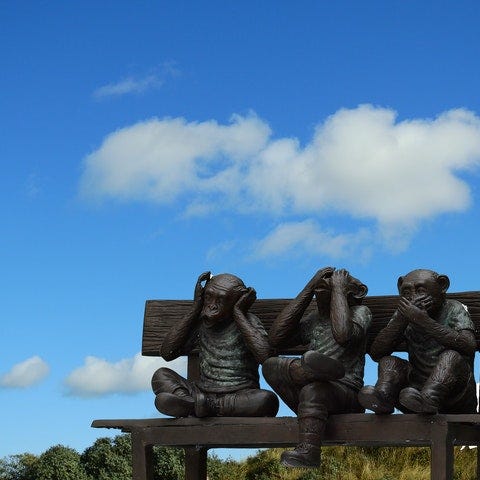To start the week off we bring you a lovely set of thoughtful, lyrical, captivating notes and meditations on the twin arts of poetry and gardening from the always excellent
. Though these thoughts on his process, sensibility and summer time living are both useful and aesthetically satisfying in themselves I would strongly recommend that all readers here head over to James’ Substack to check out his poetic works.Today’s piece is a wonderful appetiser but the main course is to be found in his catalogue of sonnets.
Enjoy.
TJB.
Maybe a should keep a journal, just as I do for gardening. A journal for my manuscript, where I can take notes of how poems grow, month to month, then year by year. Maybe I can make predictions. Maybe, like my gardening journal, I can learn from my mistakes, if I say that in the month of April it seems the words I use most are sow, whack, mow, rain, mulch and ruin maybe next year I can pay attention to those associations. Maybe, like my garden journal, I can keep a record of these years.
+++
I very rarely finish a book of poetry. I can think of many favorite opening poems, listing them without reference (so am I incorrect?), like John Ashbery’s “As One Put Drunk Onto a Packet Boat”, Briget Pegeen Kelly’s “Song”. Obviously John Berryman’s first dream song (and fourth, and fourteenth), the one that begins “Huffy Henry hid the day, / unappeasable Henry sulked.”
The reason I rarely finish a book of poems is a matter of interruption. If one considers a collection of poems as a sustained theme or melody — if the purpose of the work is told and retold, then improvised upon and elaborated on — one needs hours in the day to make sure you stay with the poems to understand its meaning. If not, you may set a book of poems down and never pick it up again. To pick up and carry on in the middle of a thought must mean the thought has sustained you. Often I am not sustained by it, just semi-interested.
Opening poems often embark, and it’s sad to think I do not see where they get to set down. I do not hold this to be the problem of the poet or their poems, this is my problem.
+++
Gardening has taught me the lessons of patience, and planning. Even as I finish my forty second cycle around the sun I have learned impatience didn’t help, as my tomato starts are stunted and wilt because I was too eager to get them out of doors, wanting to harden them too early. Now I will have to wait till next February to correct my decision. In the meantime, I write it down in a journal, which maintains a small study in little victories and many failures.
I could have used those lessons in my twenties when I kept no calendar or paid no attention to the length of the year. Having spent my twenties and my thirties, I think now more on the length of a year, on its routines, its repetitions. I think about when I am stymied to write anything and when I write emblazoned.
+++
Some of my favorite theme albums. Janelle Monae’s The Archandroid. David Bowie’s Rise & Fall of Ziggy Stardust. Joni Mitchell’s Blue. All four albums of Sufjan Stevens’ Christmas Songs, but especially the last one, Peace. Stravinsky’s The Rite of Spring as recorded by The Bad Plus. Freddie Hubbard’s Red Clay. Live albums too seem to have a theme associated to performance, often bringing in disperate songs recorded from other albums but must speak alongside each other in new and exciting ways. Stop Making Sense is arguably the best of all those recorded “live” albums, but the second volume of the DBT’s It’s Great to Be Alive! has correlations between “Used to be a Cop” and “When the Pin Hits the Shell” that I often muse on, yanking out the long grass growing high behind my rhododendrons, mostly to do with the disenfranchised American south. Donny Hathaway’s live album is a compilation of different live recordings, which I suspect needed some polishing to find the theme, that I find centered in the audience participation of “You’ve Got a Friend”.
Musicals are by association to storyline of a theme, the greatest of those being Sondheim’s Sunday in the Park with George, which is really just an attempt to turn pointillism into music. The pianist Anthony de Mare called upon contemporary composers such as Wynton Marsalis, Jason Robert Brown, Fred Hersch and Annie Gosfield to reinvent Sondheim’s songs for piano and put it in an album called Liaisons that is a constant study, both in listening and trying to play.
A friend once pointed out — not unkindly, though I took offense anyway — that I have an attachment to themes because of my growing up around musical theater.
See also love of exuberance, any glib emotion.
+++
There is no end to gardening, just cycles. There is the rest time of winter, but then that’s the time to plan. Every year is slightly different, but at this time in my life I have a general sense of what we will grow definitely, and what we will try to grow. In this cycle, the analogy I’m trying to build between gardening and writing a collection of poems fails, since a collection must in fact end — a collection is best to be thought of as one year ( or cycle ) of a garden, but then of course it takes years and years to put a collection together.
+++
I have written here and in other places my bewilderment of writing a book of poems. Aside from just taking a group of them, tossing them down a stairwell and picking them up again in the order they fell, I can’t understand how to order or correlate poems into a theme that would satisfy a reader; and, when I do read those books that engage in a narrative or thematic arc, I’m at a loss to understand how it was achieved.
Perhaps again I must think in terms of gardening. Despite the romance of strawberries vining around the stalks of tomato plants, providing a natural mulch that would retain water below, it is known that you must not plant strawberries next to tomatoes, because they are both susceptible to a fungal disease, so to keep them strong they must be separated. So despite their visual harmony the plants must be apart.
There are groupings, of alliums and legumes, which also must be separated. Then there are lettuces and carrots, which can go about anywhere. Behind the trellises growing up with peas and cucumbers I grow lettuce from seedlings, which get warm but are well shaded. Similarly carrots find their way into any part of the garden beds where there’s a spot for them, and at different times of spring and early summer, so by late summer there’s a steady crop to pull every two weeks.
But these vegetables provide a purpose in relation to each other, or at least in the general husbandry of the house. A poem within a manuscript should stand alone and in complement to its neighbors. If it must sit in the shadow of another poem, or is a filler, does it fulfill its purpose? Or should it be culled?
+++
Taking the advice of the poet Annie Finch, I printed out my manuscript, over seventy pages of more than thirty poems, and took an uninterrupted evening to read the entirety of the book, from table of contents to end notes, slowly, meditatively. It completely blew up the book. What I thought had been an organized thought piece on youth and travel, on appropriation, became something more about madness and ghosts, still about appropriation. By the time I finished reading, a small notebook had pages of extra notes, and I had a clear idea that I completely needed to start over.
+++
By the middle of the summer, I’m tired of gardening. It’s a good time to be tired, but not a good time to lose vigilance, especially when it comes to watering. I use the soaker hose mostly by then, but the soaker hose doesn’t get to everything. Similarly, there is a point in which I’ve exhausted the interest of a manuscript, the poems themselves don’t even behave like old friends, just tedious roommates.
By the middle of the summer, too, a new task is at hand. The canning. If I do not want to waste the piles of green beans I’m picking every five days, if I want to preserve the roma tomatoes ripe and delicious right off the stalk, the time has come to take out the canning pot, inventory how many jars I have, check my stock of sealing lids, and pull down my recipe book. Mostly it is the preparation that takes the most time, and is the hardest to do. Similarly, a collection of poems needs to be printed, they need to be published. In a book, the poems must either harden into their place in the order they are placed in, or fall off the vine. Some poems wilt in place.
+++
When on the rare chance a book of poems holds my interest long enough to get to the end it is often felt I’ve journeyed from one side of the book to the other. The latest of these was Czelaw Milosz’s Unattainable Earth, and I responded and was engaged in his thesis of poems next to prose pieces that look back on the poems, that seem to live, as Milosz writes in the preface, “go mong people, was feeling, thinking, getting acquainted with others’ thoughts, and tried to capture the surrounding world by any means, including the act of the poem, but not only.”
+++
If a poet has a preface to their work, read it but do not read it first. Read the table of contents first. Read it slowly, word for word, to glean a sense of what the poems inside might be. Then read the preface. If a poet is not entirely full of their own bullshit, a preface is a key part in understanding what the purpose of the book is. If a book is without purpose, consider that. If a poet has no table of contents, consider that. If there is no preface, consider that.
+++
My manuscript does not have the need for a preface.
+++
I have a garden journal and a gardening binder. The binder is three ringed with a printed calendar year, where I keep a tally of the dates I planted or when I’ve fed the plants; flyers from the local nursery about tips for garlic, potatoes, cosmos, or others I have picked up throughout the years; some printed sheets of canning recipes. Also Wendell Berry’s The Country of Marriage, usually tucked in behind old and opened seed packages.
When I’m finished with a day of gardening: watering, pulling weeds, opening the soil and planting seeds, I pour a beer, light a cigar and sit on a dead maple stump in a corner of my yard, reading Berry and dreaming of the next week. For all my desires, impatience for the pea blossoms to turn to peas, for the carrots to root down deep, for my manuscript to live itself beyond me and captivate another, for as long as the cigar burns and beer is gulped in the sunshine, I am happy. This to me is what it means to garden, to sit alongside what I’ve helped grow, dreaming of a future, and thinking hard about the past.






